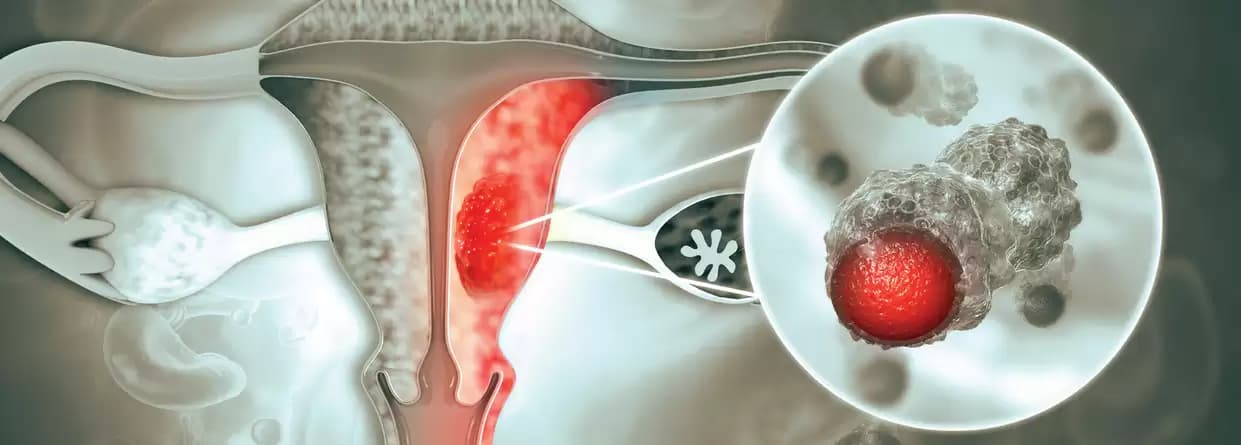
Endometrial cancer is one of the common reproductive conditions and gynaecologic cancer which originates in the female reproductive system. It occurs in the uterus, or womb, which is a hollow organ placed in the lower abdomen. The uterus wall consists of an inner lining known as the endometrium and an outer layer of muscle tissue referred to as the myometrium.
Endometrial cancer is one of the common reproductive conditions and gynecologic cancer which originates in the female reproductive system. It occurs in the uterus, or womb, which is a hollow organ placed in the lower abdomen. The uterus wall consists of an inner lining known as the endometrium and an outer layer of muscle tissue referred to as the myometrium.
Endometrial cancer also known as uterine cancer is identified to be the most common condition between the ages of 60 and 70. There are other cells in the uterus that can transform into cancer such as muscle or myometrium cells.
Usually, women having endometrial cancer aren’t aware of it as sometimes they don’t experience any symptoms. This is why doctors recommend females visit a gynecologist once a year. Since it is a common condition among women, it is crucial that they comprehend everything related to it. In this write-up, we will cover comprehensive information on endometrial cancer so make sure to stick to the end.
Endometrial cancer is a type of carcinoma that appears in the reproductive organs of a female. As per studies, it is the fourth most commonly occurring cancer after other cancer types, such as lung cancer and colorectal cancer. The condition is treatable and the rate of survival is more than 75%.
If you can identify this disease earlier, the survival rate is much greater. This condition is called endometrial cancer because it develops in the endometrium which is in the inner part of the uterus.
If you want to avert the disease or want to suspect it earlier, you must be mindful of the symptoms of this disease. Unfortunately, most of the time, there are no symptoms of uterine cancer or the symptoms are mild and hard to notice. If there are symptoms, it always appears when it has already reached an advanced stage. However, the symptoms vary from woman to woman and depend on the health conditions of a woman.
The most common endometrial cancer symptoms you should know are:
The types of endometrial cancer have been grouped into four categories which are p53 mutation, POLE mutation, copy number high, and copy number low. Medical trials are in process for assessing the right treatment for each group which also include immunotherapy trials.
Researchers and healthcare experts aren’t certain of the right endometrial cancer causes. All they know is that there is something that causes changes in the DNA cells in the endometrium. According to experts, there are certain risk factors that contribute to an increase in the risk of endometrial cancer. Here are these risk factors:
The doctor will initiate endometrial cancer diagnosis in the following steps:
Usually, females with endometrial cancer require surgery. The endometrial cancer treatment plan entirely depends on the cancer type and the entire health of a female.
Here are the treatment options to cure the condition:
Additionally, the doctor will recommend making certain lifestyle changes as well to the person experiencing this condition. It will also help in improving the condition drastically.
Preventing endometrial cancer usually is not possible, but you can involve some steps to alleviate the risk such as:
If you observe early signs of endometrial cancer, or you notice a change in your body, make sure to consult your doctor as soon as possible. Your doctor will find out if there is anything wrong or not, it will help you to put your mind at ease. And if you have endometrial cancer or any other reproductive condition, then you can start receiving treatment on time. You must make sure to follow the medications or any lifestyle changes recommended by your doctor. Uterine cancer these days has become one of the common conditions, but with the right treatment on time, it can be treated.
FAQs
Endometrial cancer is also known as uterine cancer and there is no difference as it occurs in the uterus.
No, a pap smear is not useful for detecting endometrial cancer. If you suspect that you might have this condition, you must consult your gynaecologist.
Written and Verified by:

Dr. Tripti Dadhich is the Additional Director of Obstetrics & Gynaecology Dept. at CK Birla Hospital, Jaipur, with over 25 years of experience. She specializes in high-risk pregnancies, infertility treatments, and advanced gynecological surgeries.
Similar Obstetrics and Gynaecology Blogs
Book Your Appointment TODAY
© 2024 RBH Jaipur. All Rights Reserved.